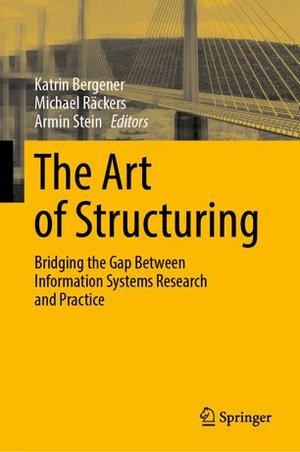Publikationen

Mit unseren Publikationen decken wir die unterschiedlichsten Forschungsbereiche ab, die sich im Feld von Mensch, Aufgabe und Technik ergeben. Neben traditionellen Themen der Wirtschaftsinformatik wie Wissensmanagement und Geschäftsprozessmanagement, finden Sie dabei auch Beiträge zu aktuellen Themen wie Blended Learning, Cloud Computing oder Smart Grids. Nutzen Sie diesen Überblick, um sich einen Eindruck über die Bandbreite und Möglichkeiten der Forschung der Wirtschaftsinformatik am Standort Essen zu verschaffen.

Art der Publikation: Beitrag in Sammelwerk
Linguistic Structures in the Light of the Digital Transformation: Addressing the Conflict Between Reference and Change
- Autor(en):
- Frank, Ulrich
- Herausgeber:
- Bergener, Katrin; Räckers, Michael; Stein, Armin
- Titel des Sammelbands:
- The Art of Structuring: Bridging the Gap Between Information Systems Research and Practice
- Seiten:
- 41-54
- Verlag:
- Springer Nature
- Veröffentlichung:
- 2019
- ISBN:
- 978-3-030-06234-7
- Digital Object Identifier (DOI):
- doi:10.1007/978-3-030-06234-7
- Volltext:
- <a href="/fileadmin/migratedchairt3assets/file/Ulrich-Frank-Seiten-aus-The_Art_of_Structuring.pdf" class="pdf">Linguistic Structures in the Light of the Digital Transformation: Addressing the Conflict Between Reference and Change (454 KB)</a>
- Link zum Volltext:
- https://link.springer.com/chapter/10.1007/978-3-030-06234-7_5
- Zitation:
- Download BibTeX
Kurzfassung
Information systems are at the core of the digital transformation. To cope with the dynamics of new, emerging markets and ever changing requirements, it is often argued that agile approaches to software development are mandatory. Some even demand to develop information systems without conceptual models, because they were likely to be outdated even before the software is implemented. While such a proposal is not acceptable for serious reasons, conceptual modelling is indeed facing a remarkable challenge in times of change. On the one hand, economics demand for reuse and interoperability, hence, for stable references. On the other hand, freezing structures is likely to compromise a software system's adaptability. Based on an analysis of this conflict and further challenges, it will be shown how languages for conceptual modelling can be designed to support both, the need for reference and the demand for change.
